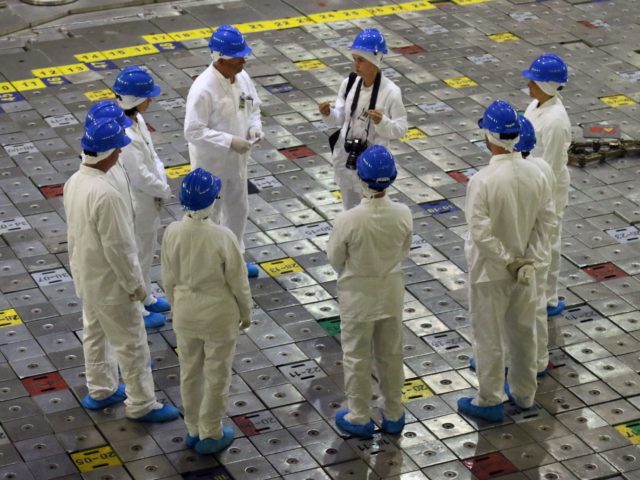Belarus began operating its first nuclear power plant on Tuesday in the western town of Astravets, located just 30 miles from Lithuania’s capital.
The plant’s opening faced opposition from European Union (EU) members Lithuania and Latvia, who both share a border with Belarus and expressed concerns about the plant’s threat to regional safety and national security.
Unit 1 of the Astravets nuclear plant “was connected to the country’s unified power grid at 12:03,” the Belarusian Energy Ministry announced in a statement on November 3, Belarus state news agency BelTA reported.
The nuclear facility is located roughly 30 miles from the Lithuanian capital, Vilnius. It was built by Rosatom, Russia’s state atomic energy corporation, and financed by Moscow through a $10 billion loan. Belarus is an ex-Soviet country that neighbors Russia and maintains strategic ties to the Kremlin. Moscow provides Belarus with over 80 percent of its overall energy needs.
“Currently, Lithuania and Belarus are part of the same Moscow-controlled BRELL power grid, which also includes the other Baltic states [Latvia and Estonia]. In the grid, the reserve and emergency power capacity is currently provided by the Kruonis pumped storage plant in Lithuania,” LRT, the national public broadcaster of Lithuania, reported on October 27.
“Critics say the [Astravets] plant will be used to increase Belarus’ dependence on Russia, and will also pressure the Baltic states against switching from the BRELL energy grid that includes Belarus and Russia,” LRT claimed.
“Estonia, Latvia, and Lithuania are due to connect with the continental European [energy grid] system by 2025. To oppose the export-orientated project, Lithuania has been seeking a joint Baltic boycott of its energy,” the broadcaster explained.
Lithuania’s government has also alleged that the Astravets nuclear plant was “built in violation of safety and environmental requirements,” according to the report.
“Rosatom rejected the complaints, attesting that the facility complies with all the safety standards of the International Atomic Energy Agency (IAEA),” Radio Free Europe/Radio Free Liberty (RFE/RL) reported.
In anticipation of Astravet’s opening, Lithuania passed legislation to block electricity imports from Belarus once the plant began operating. The country kept its promise on Tuesday when Lithuania’s transmission system operator Litgrid said it had ceased all power trading with Belarus after detecting the start of energy production at Astravet.
“Astravets is a geopolitical project, but the ban is meant to reduce motivation for it, to keep it from becoming profitable,” Lithuanian Energy Minister Zygimantas Vaiciunas told reporters on Tuesday.
“Latvia said it had also blocked imports of energy generated at the plant and vowed not to purchase Russian electricity if Moscow was unable to prove imports did not originate from the Belarusian plant,” according to RFE/RL.
Astravets’ two nuclear reactors are expected to produce up to 2,400 megawatts of electricity once the plant becomes fully operational in 2022.

COMMENTS
Please let us know if you're having issues with commenting.